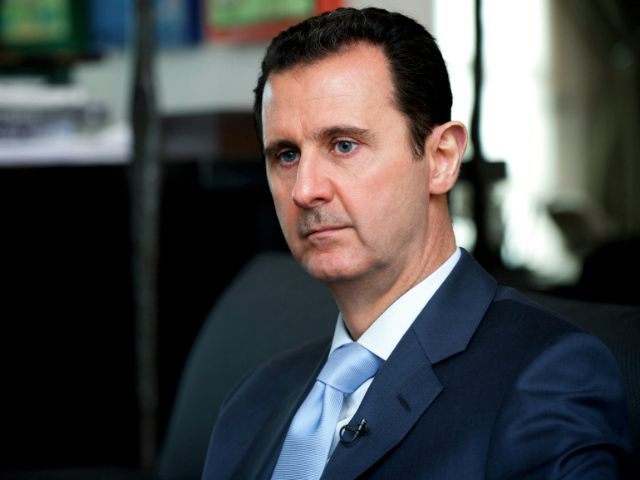Russian lawmakers meeting with Syrian head of state Bashar al-Assad on Sunday claim he is open to holding elections that may result in his removal from power, but only after “terrorists”–a word Assad has often used as a blanket term for any Syrian opposition–are defeated.
“Victory over terrorism” is required for Assad to hold elections again, Russian legislator Alexander Yushchenko told reporters after meeting with Assad in Damascus, the Associated Press reports. Sergey Gavrilov, another Russian legislator, who accompanied Yushchenko on the trip, expressed similarly that “the first aim [of Assad is ‘the struggle with and victory over … terrorism, and after that the elections–parliamentary and president elections.” Gavrilov added that Assad was “ready for broad dialogue with all responsible political forces that care about Syria. He is ready for parliamentary elections, constitutional reform, presidential elections if necessary.”
Elections, Yushchenko quoted Assad as stating, would have to be organized “on the basis of all political forces that want Syria’s prosperity.” The AP notes that “the Syrian government considers the entire armed opposition to be ‘terrorists,'” but did not specify whether Assad considers any opposition legitimate.
Some are considering Assad’s emphasis on “victory over terrorism” before elections as a sign that he would like all opposition to his rule eliminated before being up for reelection again. CBS News ran the AP story with the headline “Syria’s Assad Allegedly Open to Elections, but only if He Wins.”
Assad was reelected president of Syria in June 2014 with 88.7 percent of the vote. Elections in regions home to the strongest anti-Assad opposition were hindered from voting by ongoing battles, as the civil war had turned three years old by the time elections came around. The U.S. Department of State called the election a “sham” and refused to recognize the result.
Assad’s meeting with Russian lawmakers in Damascus followed a surprise trip by the head of state himself, who visited Moscow last week, the first time he has left the country on a diplomatic trip since the beginning of the Syrian Civil War in 2011. On that trip, Assad personally expressed “huge gratitude” to Russian President Vladimir Putin and praised Russia for preventing “terrorism” from “swallow[ing] up a much greater area” of Syria than it already has.
In that meeting, Putin later alleged, Assad expressed a willingness to work with some opposition groups against the Islamic State terrorist group, particularly the Kurdish Syrian militias, the YPG, and YPJ. Assad would work with “an armed opposition force that was genuinely ready” to fight ISIS, he claimed. Putin allegedly also attempted to approach the Free Syrian Army, a rebel group with ties to the United States, to cooperate in attacks on the Islamic State, but the group rejected Russia’s offer, citing opposition to Assad.
America’s position on the continued presence of Assad in Syria has been ambiguous. Secretary of State John Kerry said in September that he believes the “long-term presence of Assad” as head of state is necessary to eradicate ISIS. President Barack Obama, addressing the United Nations General Assembly days later, insisted that “tyrants like Bashar al-Assad who drops barrel bombs to massacre innocent children” needed to be removed from power as soon as possible, and a “managed transition” to a new government was necessary.
The government of Turkey, which has been the most vocal in calling for Assad’s removal as soon as possible, has also issued statements suggesting it would support Assad’s temporary stay in power to establish the security necessary to hold free and fair elections. “Work on a plan for Assad’s departure is under way. … (Assad) can stay for six months and we accept that because there will be a guarantee of his departure,” a Turkish source told Reuters last week. “There is not an exact consensus on when the six-month period would begin,” the source added, “but we think it won’t be too long.” Turkish Prime Minister Ahmet Davutoglu has since accused Assad of being involved in the planning of the bombing of a Kurdish peace rally in Ankara, alongside ISIS and the Kurdistan Workers’ Party (PKK). The Ankara bombing is considered the deadliest terror attack in post-Ottoman Turkish history.
Saudi Arabia, meanwhile, has made clear its opposition to Assad’s having a say in the political progress of the nation. Foreign Minister Adel al-Jubeir told reporters from Cairo that his nation believes Assad can have “no role in Syria’s future,” according to Reuters.

COMMENTS
Please let us know if you're having issues with commenting.